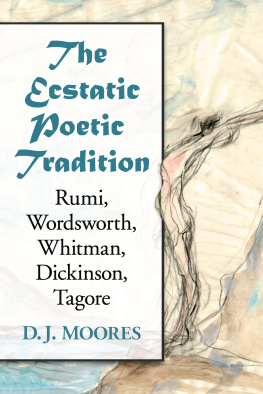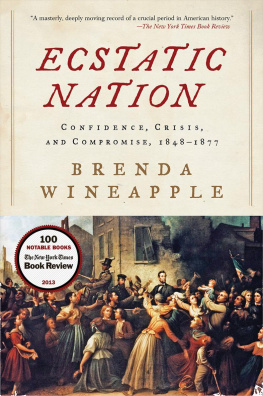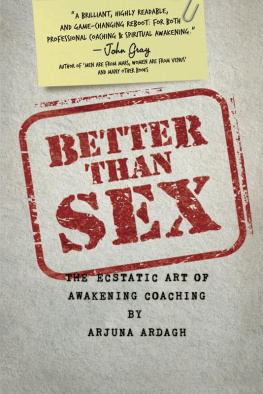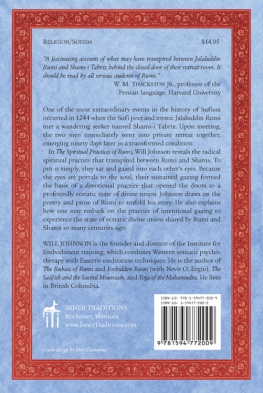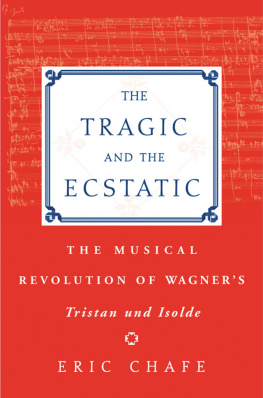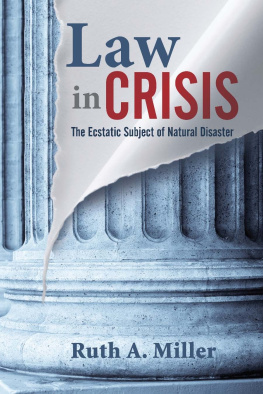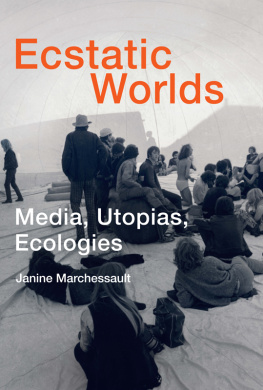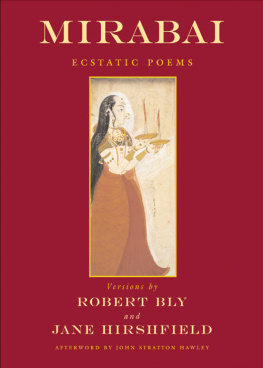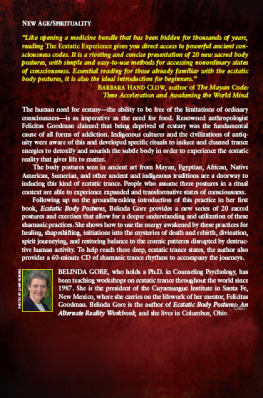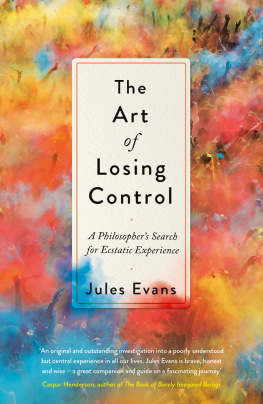
The Ecstatic Poetic Tradition
A Critical Study from the Ancients through Rumi, Wordsworth, Whitman, Dickinson and Tagore
D.J. Moores

McFarland & Company, Inc., Publishers
Jefferson, North Carolina
The following poems are reprinted by permission of the publishers and the Trustees of Amherst College from The Poems of Emily Dickinson, edited by Thomas H. Johnson (Cambridge, MA: Belknap Press of Harvard University Press), Copyright 1951, 1955, 1979, 1983 by the President and Fellows of Harvard College: It is a lonesome glee (J774/F873), One joy of so much anguish (J1420/F1450), If all the griefs I am to have (J1726/F1756), Much madness is divinest sense (J435/F620).
Excerpts from The Masnavi: Book One, by Jalal al-Din Rumi and translated by Jawid Mojaddedi, are reprinted by permission of Oxford University Press.
LIBRARY OF CONGRESS CATALOGUING DATA ARE AVAILABLE
BRITISH LIBRARY CATALOGUING DATA ARE AVAILABLE
e-ISBN: 978-1-4766-1473-1
2014 D.J. Moores. All rights reserved
No part of this book may be reproduced or transmitted in any form or by any means, electronic or mechanical, including photocopying or recording, or by any information storage and retrieval system, without permission in writing from the publisher.
Front cover image 2014 Shutterstock
McFarland & Company, Inc., Publishers
Box 611, Jefferson, North Carolina 28640
www.mcfarlandpub.com
To the following:
Harold Klemp, my teacher for so long.
Mom and Dad, for your support and encouragement over the years.
Tatsiana, for your love and devotion.
Preface
This book about the poetics and aesthetics of ecstasy has three points of origin: personal, incidental and academic.
Personal. When I teach ecstatic poetry I always ask my students if they have ever had an ecstasy, and I almost always hear a resounding yes. Of course, they always ask me if I have ever had one, and my response is also always a resounding yes. When I was fourteen years old, at a time when most people around me believed I was eventually headed for prison or worse, I had a strange, spontaneous experience that forever changed me. The details are too personal to recount here, but suffice it to say that they constituted what I call in this book an ecstasy. No drugs were involved, and although the experience occurred spontaneously, I had begun meditating a short time before it happened. I intuitively feel the two (meditation and ecstatic experience) are connected. This ecstasy, regardless of its cause, informs all of my professional work.
Incidental. After teaching ecstatic poetry for several years and hearing my good students complain when I required them to buy sometimes up to eight different books for a given course, I conceived of the idea of creating an anthology of ecstatic verse so I could put all of the poets we were studying in one inexpensive text. Before finally getting the work published(Wild Poets of Ecstasy, 2011)I received the inevitable round of rejections. In one of these Harry Keyishian, the director of Fairleigh Dickinson University Press, rejected the work because, as he said, Fairleigh Dickinson does not publish anthologies. He did say in passing, however, that he and his team of editors saw great potential in a monograph on the topic. So as I wrote the introduction to the anthology, I did so with the idea that I was setting the stage for a larger work. As I finished what ended up being a rather long opening, I realized I indeed had much more to say. The present work is a continuation of that discussion.
Academic. This book is also inspired by a collaboration with my friend James Pawelski, the executive director of the International Positive Psychology Association. I first met James in a meeting I had with him at the University of Pennsylvania, where he runs the graduate program in positive psychology. Shortly after our meeting, he and I decided to collaborate on an edited collection of essays, The Eudaimonic Turn: Well-Being in Literary Studies (2012). In weekly conversations that continued for about a year, James impressed me with his staggering amount of knowledge related to the new multi-disciplinary discourse on human flourishing, which Owen Flanagan has called eudaimonics. I consequently realized, more fully than I already did, that the topic of ecstatic experience is intimately tied to the question of well-being.
Before I began engaging the findings of positive psychology, nevertheless, I intuitively located ecstatic poetry in the larger subject of well-being, particularly in my first book, Mystical Discourse in Wordsworth and Whitman (2006). Noticing that many of my colleagues often either dismissed the ecstatic experience as religious nonsense or interpreted it as a symptom of psychological disease or objectionable ideology, I tried to demonstrate, in a different discursive register, that the use of ecstatic language, particularly mystical language, actually enabled Wordsworth and Whitman to challenge many of the Enlightenments jaundiced ideas: the overemphasis on reason and the marginalization of alternative ways of knowing; the reduction of human experience to cognition; the marginalization or maltreatment of affect; Cartesian subjectivity and the separation of mind from matter; mechanism and the objectification of nature; and others. I carried this challenge into my second book, The Dark Enlightenment (2010), arguing, from a postJungian perspective, for the immense psychological (and thus eudaimonic) value of the Romantic encounter with and retrieval of the unconscious other, so often configured in the form of woman, nature, affect, irrationality, madness, childhood, and the like. This encounter is quintessentially ekstatic. In the present book, I try to support the same general challenge, but this time through an account of why ecstatic poetry existed almost ubiquitously in the ancient world and also why it continues to speak to us in the contemporary era.
I am grateful for having received much guidance, help, and support from multiple people to whom I am indebted: the administrative leaders at Kean University who funded generous grants and provided me with ample resources; James Cowan at the OCC library, who processed hundreds of interlibrary loans for me; Christina Walling, Amanda Foster, David Museliani, Nikiesha Hatch, Anthony Melillo, and Belinda Joyner, who helped me with the tedious but important work of transcribing notes; and Gabriella Basile, who helped me with securing permissions. Thanks to all of these good people. I would also like to thank Adam Potkay, a friend whose inspiring work, The Story of Joy, has changed literary studies and helped to make possible the eudaimonic turn in the discipline. Adams work renders mine all the more relevant.
I hope you enjoy the study.
Part One: Ecstatic Beginnings
1. The Overture
Ecstasy is a powerfully transformative, affective experience. While it is related to joy, happiness, flow, elevation, and sublimity, it is not exactly synonymous with any of these concepts. Best described as a peak experience, as Abraham Maslow called it, ecstasy can be characterized in myriad ways and finds configuration kaleidoscopically in a variety of forms in religious and secular experience. The term is etymologically related to the Greek word
Next page
